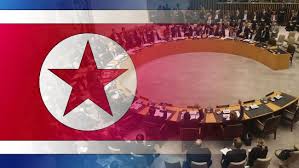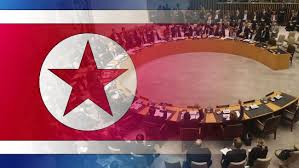
North Korea’s export earnings would be slashed by some $800 million as the United Nations Security Council is set to vote on Wednesday to impose new sanctions on North Korea for its fifth and largest nuclear test, diplomats said.
The new measures that are largely target the hermit Asian state's coal export earnings have been agreed upon by the council's five veto-wielding powers - the United States, China, Britain, Russia and France, diplomats said.
"We didn't get everything we wanted," said a U.S. official familiar with the draft resolution, though he added the proposed new sanctions were "pretty good."
Over two months have been spent on negotiating new sanctions by the United States and China, a North Korea ally, even as North Korea, which conducted its latest nuclear test on Sept. 9, has been under U.N. sanctions since 2006 over its nuclear and missile tests.
The coal imports from North Korea to China would be cut by some 60 percent, or $700 million on 2015 sales, diplomats said, under the U.S.-drafted U.N. resolution likely to be adopted on Wednesday as China is believed to be the only country that now buys North Korean coal.
Starting on Jan. 1, North Korean coal exports could be capped at $400.9 million or 7.5 million metric tonnes annually, whichever is lower, by the new sanctions. Up almost 13 percent from a year ago, China has imported 18.6 million tonnes of coal from North Korea over the first 10 months of this year.
Coal is North Korea's largest single export item and is the only sources of hard currency. Export of copper, nickel, silver and zinc, which the U.S. official said is worth about $100 million a year, would also be banned according to the draft U.N. resolution.
The U.S. official said had that sale of statues by North Korea has reaped contracts worth tens of millions of dollars for Pyongyang and the draft text would prohibit the sale of statues.
"Pyongyang has prioritized the pursuit of nuclear weapons over just about everything else ... so we don't think this action here in New York will immediately convince the regime's leader (Kim Jong Un) to cease his pursuit of nuclear weapons, the U.S. official said.
"We do note that our action will be felt and will impede the DPRK (North Korean) regime's ability to continue these program," the official said.
Selling North Korea helicopters or vessels by countries would be prohibited according to the draft resolution.
Amid concerns that Pyongyang had used its diplomats and foreign missions to engage in illicit activities, the draft requires countries to limit the number of bank accounts to one per North Korean diplomatic mission and calls on U.N. states to reduce the number of staff at North Korea's foreign missions.
Personal luggage of individuals entering or leaving North Korea could be a way to transport banned items and therefore countries can inspect them, the draft text says.
The Security Council could put a global travel ban and asset freeze for their role in the North Korea's nuclear and ballistic missile programs 11 individuals, including people who have served as ambassadors to Egypt and Myanmar, and 10 entities who would be blacklisted.
(Source:www.cnbc.com)
The new measures that are largely target the hermit Asian state's coal export earnings have been agreed upon by the council's five veto-wielding powers - the United States, China, Britain, Russia and France, diplomats said.
"We didn't get everything we wanted," said a U.S. official familiar with the draft resolution, though he added the proposed new sanctions were "pretty good."
Over two months have been spent on negotiating new sanctions by the United States and China, a North Korea ally, even as North Korea, which conducted its latest nuclear test on Sept. 9, has been under U.N. sanctions since 2006 over its nuclear and missile tests.
The coal imports from North Korea to China would be cut by some 60 percent, or $700 million on 2015 sales, diplomats said, under the U.S.-drafted U.N. resolution likely to be adopted on Wednesday as China is believed to be the only country that now buys North Korean coal.
Starting on Jan. 1, North Korean coal exports could be capped at $400.9 million or 7.5 million metric tonnes annually, whichever is lower, by the new sanctions. Up almost 13 percent from a year ago, China has imported 18.6 million tonnes of coal from North Korea over the first 10 months of this year.
Coal is North Korea's largest single export item and is the only sources of hard currency. Export of copper, nickel, silver and zinc, which the U.S. official said is worth about $100 million a year, would also be banned according to the draft U.N. resolution.
The U.S. official said had that sale of statues by North Korea has reaped contracts worth tens of millions of dollars for Pyongyang and the draft text would prohibit the sale of statues.
"Pyongyang has prioritized the pursuit of nuclear weapons over just about everything else ... so we don't think this action here in New York will immediately convince the regime's leader (Kim Jong Un) to cease his pursuit of nuclear weapons, the U.S. official said.
"We do note that our action will be felt and will impede the DPRK (North Korean) regime's ability to continue these program," the official said.
Selling North Korea helicopters or vessels by countries would be prohibited according to the draft resolution.
Amid concerns that Pyongyang had used its diplomats and foreign missions to engage in illicit activities, the draft requires countries to limit the number of bank accounts to one per North Korean diplomatic mission and calls on U.N. states to reduce the number of staff at North Korea's foreign missions.
Personal luggage of individuals entering or leaving North Korea could be a way to transport banned items and therefore countries can inspect them, the draft text says.
The Security Council could put a global travel ban and asset freeze for their role in the North Korea's nuclear and ballistic missile programs 11 individuals, including people who have served as ambassadors to Egypt and Myanmar, and 10 entities who would be blacklisted.
(Source:www.cnbc.com)





